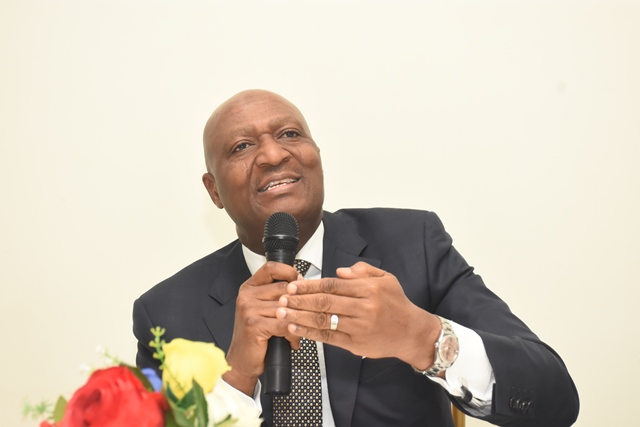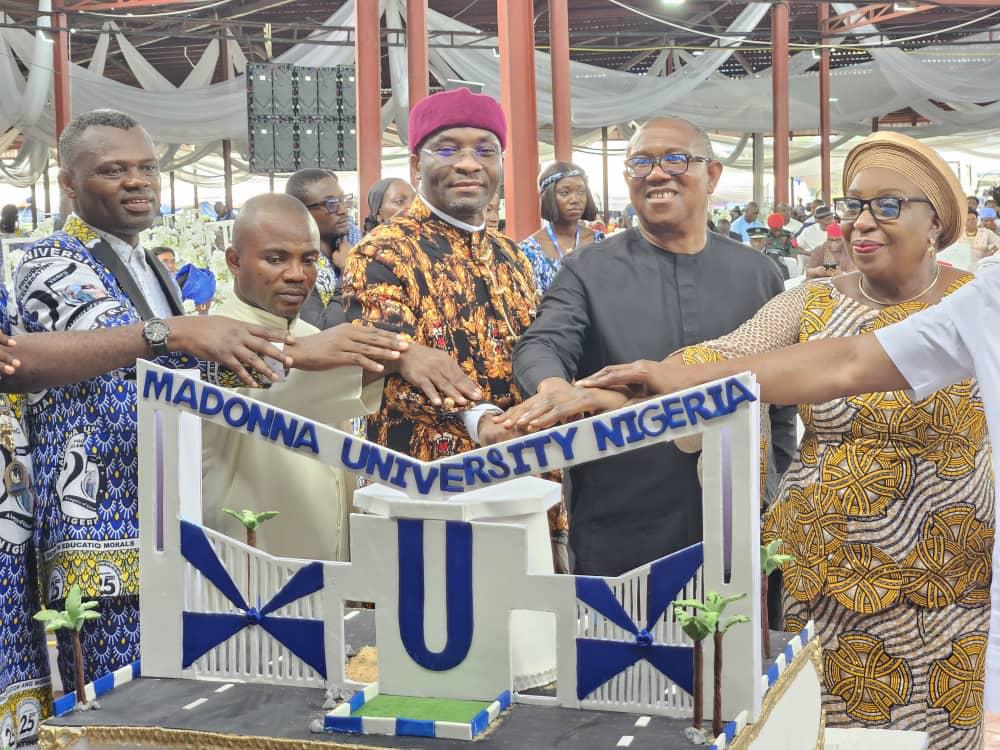Photos by Ken Ehimen
In the face of several challenges that have in recent times befuddled optimal performance in Nigerian football, preparations for the Russia 2018 Mundial has succinctly buttressed the importance of investing in the sector, which holds great economic potentials for the country.
This fact was made bare at the GTI’s first Football Townhall Meeting with investment and finance analysts, policy makers; finance and sports journalists in a brainstorming session on football and its subservience to economic development, at the GTI House in Lagos on Thursday, June 7, 2018.

MD GTI Asset Management, Mr. Amos Aledare
Speaking at the event, the Group Managing Director/Chief Executive Officer, GTI Capital Group, Mr. Abubakar Lawal tasked Nigerians to see the period as best time to invest in sporting activities, especially football as a business that is capable of growing the nation’s economy.

Engineer Adewunmi Adeyemo, MD GTI Micro-finance Bank, Mrs. Hauwa Haruna-Sheidi with a guest
The GMD hinted that, “Apart from oil production in the country, football and other sports competitions have occupied a vantage position in building the desired economy for the country. He reaffirmed the need to shift attention to sporting activities from oil”.
He pointed out that with possible combination of football and oil exploration development, the nation could easily tackle the high rate of poverty level which currently stands at 60.7 percent, grow the GDP and position Nigerian economy on strong pedestal.
Answering questions on how the country missed it, Lawal identified government’s succession problem, negative perceptions against the country and its citizenry, corruption, nationalist problems and other sharp practices like bending the rules as responsible for sports underdevelopment in Nigeria, pointing out that sports provided a veritable platform for public and private sectors to make money for the country and citizens.

Finance Director GTI Group, Mr. Boye Adegbemi with Engr. Adewunmi Adeyemo
On his own part, the Chief Economist/Head, Corporate Transformation, GTI, Professor Martin Ike-Muonso, argued that football in Nigeria served as a means of social cohesion and the building of the communities.
According to him, as at 2012, about 43 million Nigerian youths were actively involved in sports with official statistics suggesting that about 93 percent of this number were involved largely in football.
He said, “3.53 percent of these numbers were professionals while the rest were involved solely for recreational purposes as fans. This is consistent with 2014 Repucom world football report which equally found out that about 85 percent choose football as the favorite sports to watch on TV.

Mr. Nnamdi Obi with Mrs. Olufunke Tona-Obafemi
He further harped on the enormous economic benefits of the game to the country quoting its stupendous accrual to the UK economy.
“The premier league presents a fantastic example of the prospects held by the football economy. The league’s economic impact on the UK economy shows that it improves the national economy by 6.2 billion pounds; domestic output by 3.4billion pounds and 2.4billion pounds in taxes. Over 6000 jobs are directly provided by the league while it supports the provision of more than 103 thousand jobs across the UK through the clubs.”

Mr. Pius Ayinor
Elaborating on the course to take while investing in the sector, Professor Martin averred that;
“A mutual fund type investment vehicle that focuses exclusively on establishing a vibrant football ecosystem may be a good stimulator of these initiatives. Such a vehicle should be able to use the extant tremendous support base to translate the value chains in the sub sector into vibrant generators of surplus values. Substantial parts of funds should be invested in the upgrade of football infrastructure and real estate such as stadia. It should also support the emergence of vibrant clubs and construction and implementation of adequate safety nets for current and past players and eventually birth a private sector driven league”.

Mr. Pius Ayinor, GMD GTI Group, Mr. Abubakar Lawal, Lagos SWAN Chairman, Mr. Debo Oshundun with Group Sports Editor, The SUN Newspapers, Mr. Emma Jemegah
The Managing Director, GTI Asset Management and Trust Limited, Mr. Amos Aledare, listed public, private participation in growing football, encouraging rural talents, personal interest on the side of the coaches, signing of age long football strategic plans and strengthening policy framework in favour of football as leeway to getting back the desired benefits of playing football.
He also called on other stakeholders to commence with immediate effect, major restructuring and investment in the sub-sector and in line with best practices.

Chief Economist and Head, Corporate Transformation, Prof. Martins Ike-Muonso
Several other inputs from participants in the Football Town hall meeting emphasized the need for corporate institutions involvement in football, abstinence of personal interest of the coaches to uphold national interest, a detour to the grassroots to raise talents, an end to legal tussles in NFF, an end to setting up of football clubs mainly as means of siphoning funds from Government etc.

Company Secretary, GTI Group, Ms Omotayo Akapo with MD GTI Micro-finance Bank, Mrs. Hauwa Haruna-Sheidi
Other suggestions to move the game ahead were; calling on government to come up with policies that will enhance private participation, promote conducive business environment to enable local production of kits and jerseys, Infrastructural development, playing by the rule and kick out corruption, creating efficient system that will allow private businesses to come in, following the best practice as done by the rest of the world while restoring investors’ confidence, integrity and transparency in order to put the world number one sport on proper track in the country.

 News6 years ago
News6 years ago
 Featured6 years ago
Featured6 years ago
 Boss Picks6 years ago
Boss Picks6 years ago
 Headline6 years ago
Headline6 years ago
 Headline6 years ago
Headline6 years ago
 Headline5 years ago
Headline5 years ago
 Headline6 years ago
Headline6 years ago
 Headline6 years ago
Headline6 years ago





























